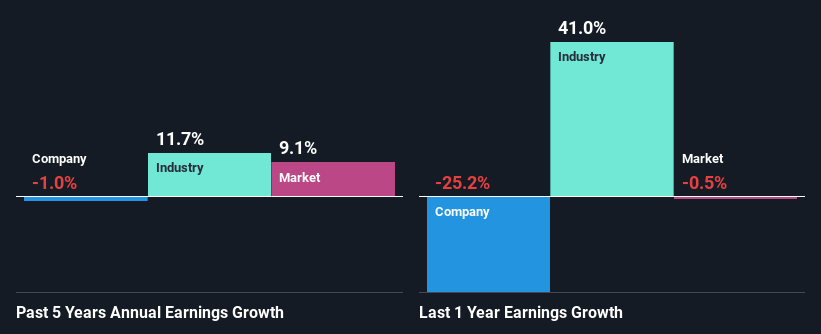Does Residential Secure Income plc's (LON:RESI) Weak Fundamentals Mean That The Market Could Correct Its Share Price?
Residential Secure Income (LON:RESI) has had a great run on the share market with its stock up by a significant 12% over the last three months. We, however wanted to have a closer look at its key financial indicators as the markets usually pay for long-term fundamentals, and in this case, they don't look very promising. In this article, we decided to focus on Residential Secure Income's ROE.
Return on equity or ROE is an important factor to be considered by a shareholder because it tells them how effectively their capital is being reinvested. In simpler terms, it measures the profitability of a company in relation to shareholder's equity.
Check out our latest analysis for Residential Secure Income
How Is ROE Calculated?
The formula for ROE is:
Return on Equity = Net Profit (from continuing operations) ÷ Shareholders' Equity
So, based on the above formula, the ROE for Residential Secure Income is:
3.0% = UK£5.5m ÷ UK£180m (Based on the trailing twelve months to March 2021).
The 'return' is the yearly profit. That means that for every £1 worth of shareholders' equity, the company generated £0.03 in profit.
What Has ROE Got To Do With Earnings Growth?
So far, we've learned that ROE is a measure of a company's profitability. Depending on how much of these profits the company reinvests or "retains", and how effectively it does so, we are then able to assess a company’s earnings growth potential. Generally speaking, other things being equal, firms with a high return on equity and profit retention, have a higher growth rate than firms that don’t share these attributes.
A Side By Side comparison of Residential Secure Income's Earnings Growth And 3.0% ROE
At first glance, Residential Secure Income's ROE doesn't look very promising. We then compared the company's ROE to the broader industry and were disappointed to see that the ROE is lower than the industry average of 7.5%. As a result, Residential Secure Income's flat net income growth over the past five years doesn't come as a surprise given its lower ROE.
Next, on comparing with the industry net income growth, we found that the industry grew its earnings by12% in the same period.
The basis for attaching value to a company is, to a great extent, tied to its earnings growth. It’s important for an investor to know whether the market has priced in the company's expected earnings growth (or decline). This then helps them determine if the stock is placed for a bright or bleak future. Has the market priced in the future outlook for RESI? You can find out in our latest intrinsic value infographic research report.
Is Residential Secure Income Efficiently Re-investing Its Profits?
Residential Secure Income has a three-year median payout ratio as high as 115% meaning that the company is paying a dividend which is beyond its means. This does go some way in explaining the negligible earnings growth seen by Residential Secure Income. Paying a dividend beyond their means is usually not viable over the long term. That's a huge risk in our books. To know the 3 risks we have identified for Residential Secure Income visit our risks dashboard for free.
Additionally, Residential Secure Income has paid dividends over a period of three years, which means that the company's management is determined to pay dividends even if it means little to no earnings growth. Our latest analyst data shows that the future payout ratio of the company is expected to drop to 91% over the next three years. Regardless, the ROE is not expected to change much for the company despite the lower expected payout ratio.
Summary
In total, we would have a hard think before deciding on any investment action concerning Residential Secure Income. Particularly, its ROE is a huge disappointment, not to mention its lack of proper reinvestment into the business. As a result its earnings growth has also been quite disappointing. Having said that, looking at current analyst estimates, we found that the company's earnings growth rate is expected to see a huge improvement. To know more about the company's future earnings growth forecasts take a look at this free report on analyst forecasts for the company to find out more.
This article by Simply Wall St is general in nature. It does not constitute a recommendation to buy or sell any stock, and does not take account of your objectives, or your financial situation. We aim to bring you long-term focused analysis driven by fundamental data. Note that our analysis may not factor in the latest price-sensitive company announcements or qualitative material. Simply Wall St has no position in any stocks mentioned.
Have feedback on this article? Concerned about the content? Get in touch with us directly. Alternatively, email editorial-team (at) simplywallst.com.

 Yahoo Finance
Yahoo Finance 
